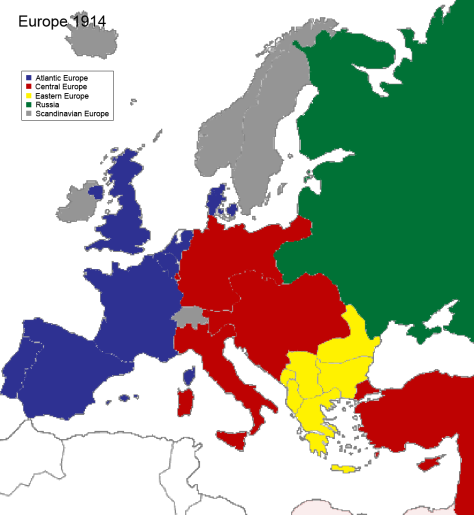
Russia Cuts Off Gas to Ukraine
June 22, 2014
Europe Of Sarajevo 100 Years Later: Was History Ever On Holiday? – Analysis
June 22, 2014
Simon Wren-Lewis
Athanasios Orphanides, leading academic macroeconomist and from 2007-12 Governor of the Central Bank of Cyprus, does not hold back in a recent paper. Here is just one quote:
“During the crisis, key decision makers exhibited neither political leadership nor political courage. Rather than work towards containing total losses, politics led governments to focus on shifting losses to others. The result was massive destruction in some member states and a considerably higher total cost for Europe as a whole. European institutions could have been the last line of defense against this destructive dynamic but instead served to facilitate and enable the destruction.”
His complaint will resonate with many from the smaller Eurozone economies. The text of the paper suggests that the way decisions are made in the Eurozone allows large countries to screw smaller countries, for short term economic gain, even if this damages the Eurozone as a whole.
He focuses on two ‘blunders’. The first was the meeting between French President Sarkozy and German Chancellor Merkel in Deauville in 2010, where these leaders suggested that a haircut should be imposed on private sector lenders to solvent governments that got in to funding difficulties. Ireland lost market access for its debt within weeks. However Orphanides notes that German debt became less costly as a result.
The second was in 2013, when the Eurogroup decided to impose a haircut on deposits of Cypriot banks, insured and uninsured. Although the decision was almost immediately recognised as a blunder, Orphanides justifiably asks how such a blunder could have been made. He suggests that it can be explained by the forthcoming German elections, and a need for the government to appear tough. The result was the destruction of Cypriot banks, which in turn gave Germany leverage to end the low Cypriot corporate tax rate.
It has not escaped at least one reader of this paper that such decisions invariably favour Germany. This is not the message Orphanides highlights. The abstract says that the paper is about how politics has dominated economics in crisis management. But what exactly does that mean? And is it really the case that economics is blameless here?
Take the Deauville decision. It is true that this hardly helped calm market nerves at the time, although Ashoka Mody argues that its impact on spreads was not that great. However it does seem to stretch credibility that this was a deliberate ploy by Germany to reduce its own borrowing costs. If it was, did Sarkozy also think it would reduce interest rates on French debt? A much more plausible explanation for this blunder is that Germany wanted to reintroduce some form of no bailout regime into the Eurozone. This may indeed have been a clumsy attempt to do so, but the real culprit was the absence of any clear economic mechanism that would allow the Eurozone to distinguish between sovereign debt crises where default was unavoidable, and sovereign debt crises which represented a self-fulfilling market panic, where the government’s fiscal position was in fact sustainable if support from other governments or institutions was forthcoming.
This problem had not been addressed in the design of the Eurozone, under the pretence that the Stability and Growth Pact would mean that such issues would never arise. It has still not been addressed today: the problem has simply been shifted on to the shoulders of the ECB in consultation with governments, who have to jointly decide whether OMT will be invoked, and under what conditions. It remains unclear under what circumstances, if any, a Eurozone government will be left to default.
It seems quite reasonable to argue in this case that politicians are left floundering, and make the occasional blunder, because the economics of the problem have not been thought through. Orphanides argues that “the domination of politics over economics has led to crisis mismanagement.” I suspect this is a little unfair on politics, and far too forgiving on economics.
This blogpost was first published on Mainly Macro
Have something to add to this story? Share it in the comments below.




